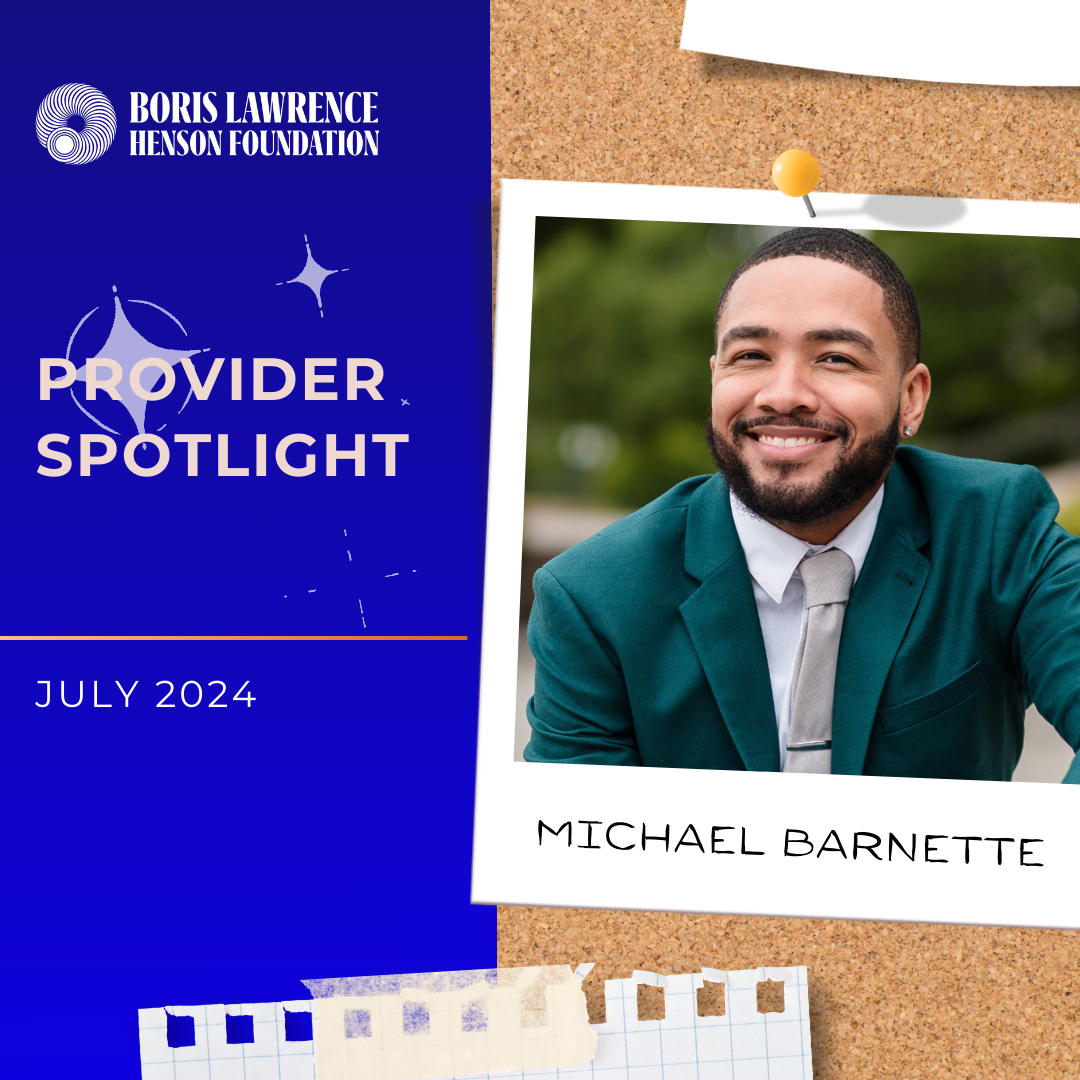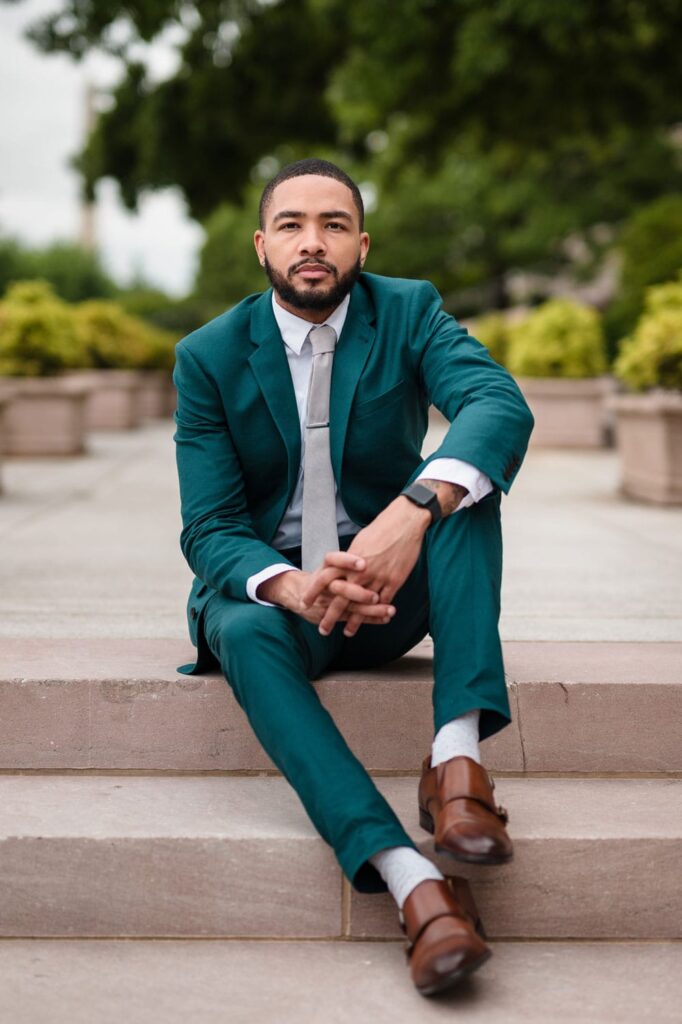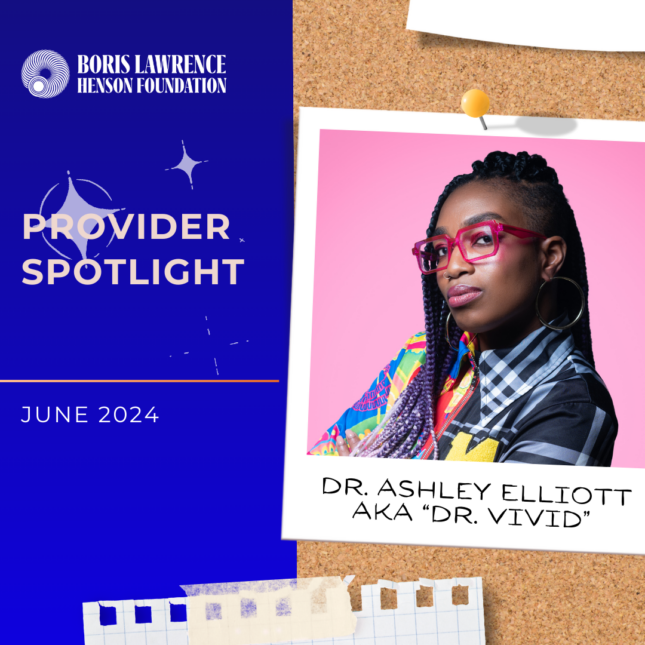
We are delighted to feature Michael Barnette in our special Provider Spotlight for July, which is
National Minority Mental Health Awareness Month. Michael recently partnered with us for our 2024 Can
We Talk? Symposium, where he spoke passionately about the importance of self-care and
seeking help as a therapist. As a Licensed Clinical Professional Counselor in Maryland,
Michael’s journey into mental health began with a profound interest in psychology during his
junior year in high school, particularly sparked by his abnormal psychology class. Growing up in
Baltimore, MD, Michael’s exploration of family dynamics and his own personal healing journey
has profoundly shaped his approach to counseling. His commitment to breaking down barriers
in mental health care extends to his role a tNew Millennial Counseling and Consulting and
Minds In Motion Therapeutic Services, a collective of Black male therapists in Maryland, where
he actively promotes mental wellness within the Black community.
Personal Touch
BLHF: How do you incorporate your personality and passions into your work with clients?
Michael: I try to lead by being myself. It may sound cliché, but too often, we feel pressured to present a version of ourselves that is deemed acceptable by others. By being authentic, it creates a comfortable environment for my clients to do the same. Then, of course, when suitable, I share information about my own healing journey and personal experiences to establish a stronger connection and show my clients that I’m a human being, too.
Innovative Approaches
BLHF: Can you share an example of a particularly creative or effective intervention that you’ve implemented?
Michael: An effective intervention that I utilize with my clients is visualization. Visualization allows the client to work through their emotional discomfort by considering alternative outcomes different from the anxiety-provoking thoughts the client may be experiencing. When clients can think about an alternative outcome, it can provide peace and create a habit of thinking of other possible options.
Tech and Tools
BLHF: Are there any apps or online resources you recommend for self-care or mental health management?
Michael: I suggest using Moodfit for tracking overall mood and goal setting and Happify to help with anxiety and increase gratitude.
Breaking Stigma
BLHF: What do you think is the biggest misconception about mental health among young adults today, and how do you address it in your practice?
Michael: I’m glad you asked this. Many young adults hold the misconception that seeking help for mental health issues is a sign of weakness. They think they should be able to handle their struggles alone, and asking for assistance could imply defeat or inadequacy. In reality, asking for help is a sign of strength and maturity. It shows awareness that a person may not have the necessary tools to manage their mental health challenges.
In my practice, I focus on promoting vulnerability, openness, and healthy expression of emotions among all my clients, with a special emphasis on my Black male clients. Many Black males have been conditioned to believe that mental health is not real or is a myth.
Men’s Mental Health
BLHF: We’d like to delve into a personal aspect. Can you share a time when you faced a mental health challenge or sought support for your emotional well-being? How did this experience influence your approach to mental health care for men in your practice, and what insights did you gain from it?
Michael: In the first 28 years of my life, I saw vulnerability as a sign of weakness and avoided showing it. I wasn’t emotionally present in my relationships with my partner, child, or loved ones. I was constantly comparing myself to others, lacked self-compassion and healthy coping skills, and worst of all, I wasn’t being honest with myself or others. My major turning point came when I realized that something was consistently off with me and certain aspects of my life began to suffer. One day, after an outing with my family, I was helping my then 2-year-old daughter clean up her toys before bed. I remember feeling disconnected and going through a negative thought cycle as I picked up her toys. Suddenly, my daughter came over to me, hugged me, looked me in the eyes and said, “Daddy, you are going to be okay and I love you.” That was the day I chose to make a change, and the beginning of my healing journey, although there have been plenty of challenging days since then.
I was able to speak to a mentor who helped me redefine vulnerability and leadership. Once I opened up and shared my experiences with others, I was able to increase my self-compassion and let go of the pressure to have everything figured out all the time.
Self-Care Tips
BLHF: As a mental health and wellness professional, how do you prioritize your own self-care and well-being?
Michael: Now, I’m not always the best at practicing self-care. When my days and weeks are busy, I try to have emotional check-ins with myself and do three things I love for at least 30 minutes to an hour each day.
When I’m intentional about my self-care, I set work boundaries! I won’t engage in emails, session notes, or anything business-related after a certain time.
Aside from that, I’m also intentional about what I consume on social media. We’ve all heard the saying, “Comparison is the thief of joy,” so I’m conscious about what I intake. In a world where it’s easy to get lost in the highlight reels of others, I try to focus on my own journey, celebrating my progress and learning from setbacks. It’s important for me to curate my feeds to include content that inspires and uplifts me.
Pop Culture and Mental Health
BLHF: How do you see pop culture influencing conversations around mental health, and do you think it’s helping to reduce stigma?
Michael: Pop culture plays a significant role in shaping societal perceptions and conversations around mental health. By incorporating mental health themes into movies, music, television shows, and social media, pop culture can both reflect and influence public attitudes toward these issues. When we hear our idols or favorite celebrities share their own journeys with mental health, they can help demystify and destigmatize these often-taboo subjects, encouraging more open and honest discussions. It provides reassurance that no one is alone in their struggles. It allows for a sense of community and understanding.
I will say it’s crucial that conversations around mental health on public platforms are had responsibly. Misinformation or sensationalized portrayals can reinforce stereotypes and contribute to stigma rather than reduce it.
Future Trends
BLHF: What emerging trends or developments in the field of mental health and wellness are you most excited about?
Michael: I am really looking forward to the future of the counseling compact. It’s incredibly encouraging that all 50 states may soon be part of the compact, which would mean that the requirements for practicing counseling would be the same in all states. This would make counseling services more accessible to individuals who currently lack easy access in their own states.
BLHF: How do you envision the future of mental health care, especially in terms of accessibility and inclusivity for younger generations?
Michael: I believe that access to mental health care will significantly increase in the next 5-10 years. As mental health becomes more prevalent, advances in technology become more accessible, and telehealth services continue to grow, services will become more readily available. To increase inclusivity, there will be a greater focus on the needs of marginalized groups, including BIPOC communities and individuals with disabilities.
Fun Rapid-Fire Round
BLHF: Favorite self-care activity?
Michael: Taking long walks with my daughter and cooking new meals for sure!
BLHF: Go-to stress-relief song or playlist?
Michael: J. Cole – Hunger on Hillside
BLHF: Last book or podcast that left a lasting impression on you?
Michael: Esther Perel – Where do we begin
BLHF: One piece of advice you wish you could give your younger self?
Michael: Focusing on the stressors of tomorrow will make you forget the joys of today.
Closing Thoughts
BLHF: Any final words of wisdom or encouragement for young adults who may be struggling with their mental health?
Michael: You are capable of overcoming your struggles and creating a better life for yourself. Be gentle with yourself and know that things will get better with time and support.
Michael Barnette’s dedication to mental health and wellness, especially within the Black community, is truly inspiring. We commend his efforts in promoting healing and resilience through his innovative approaches and personal insights. Thank you, Michael, for your commitment to empowering individuals on their mental health journey.
Michael Barnette
Licensed Clinical Professional Counselor
New Millennial Counseling and Consulting + Minds in Motion Therapy LLC
Where to find me?
Instagram: @iammichaelbarnette


